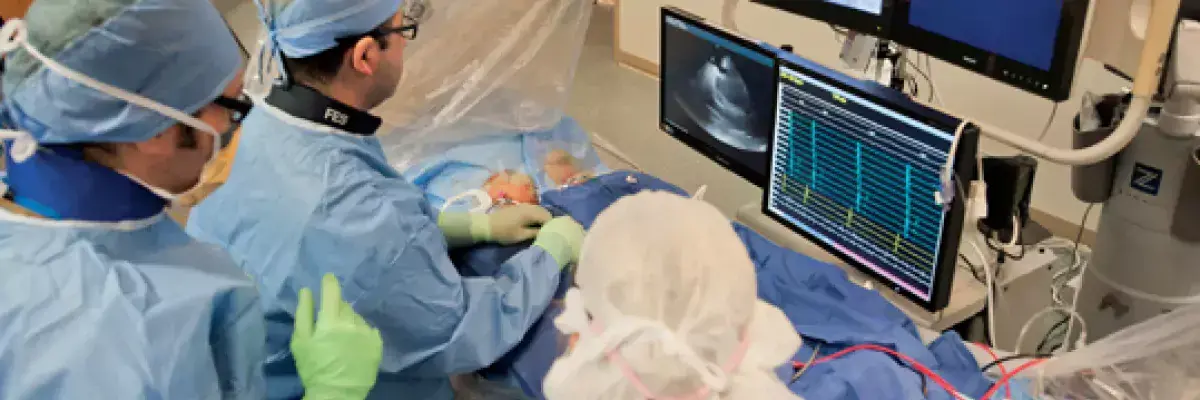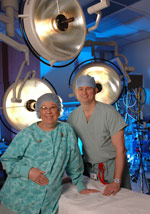Facts & FAQs About Beebe Interventional and Invasive Cardiac Care
Beebe Healthcare began building its program of Cardiac Diagnostic and Rehabilitation services in 1978. The Beebe Cardiac Surgery program and Interventional and Invasive Cardiac program began on Monday, February 5, 2007. The Beebe Healthcare Cardiac Surgery program is in affiliation with Christiana Care Health System.
Frequently Asked Questions (FAQS) About Cardiac Surgery and Interventional Cardiology
A: Percutaneous Coronary Interventions (PCI) are nonsurgical procedures used to treat persons experiencing myocardial ischemia (inadequate blood flow to the heart) or myocardial infarction (heart attack). The goal of PCI is to open up a coronary artery (blood vessel that brings blood and oxygen to the heart muscle) and restore blood flow.
A: Primary PCI is an emergency treatment performed to reduce the amount of heart muscle permanently damaged by a sudden myocardial infarction (heart attack).
A: Balloon Angioplasty (Percutaneous Transluminal Coronary Angioplasty or PTCA) is a type of PCI in which a small balloon at the tip of the catheter is placed near the blocked or narrowed area of the coronary artery. When the balloon is inflated, the blockage is compressed against the artery walls and the diameter of the blood vessel is widened (dilated) to increase blood flow to the heart.
A: Coronary Stenting involves the placement of one or more coronary stents as part of a special balloon angioplasty procedure. A coronary stent is a small, metal mesh tube that acts as a scaffold to provide support inside the coronary artery. A balloon catheter, placed over a guide wire, is used to insert the stent into the narrowed artery. Once in place, the balloon is inflated and the stent expands to the size of the artery and holds it open. The balloon is deflated and removed, and the stent stays in place permanently. There are two types of stents available: bare metal stents (BMS) and drug-eluting stents (DES). Drug-eluting stents contain a medication that is released at the stent implantation site to help prevent the blockage from reforming in the artery.
A: Beebe Advanced Cardiac Care Offers:
- Artery Coronary Bypass Graft
- CABG Valve Repair/Replacement
- Open-Heart Surgery
- Off Pump Cardiac Surgery
- Minimally Invasive Cardiac Surgery
- Coronary Angioplasty
- Stent Implantation
- Pacemaker Implants
- ICDS
- Cardiac Stress Testing
- Coronary Catheterization Diagnostics
- Ambulatory Heart Monitorin
- Echocardiogram Diagnostic Testing
- Cardiac Rehabilitation
Our highly skilled Cardiac Team includes experienced cardiac interventionalists and heart surgeons who perform advanced procedures in our state-of-the-art cardiac cath labs and operating rooms.
Beebe Healthcare offers a Cardiac and Vascular program that includes Cardiac Surgery, Interventional Cardiology, Electrophysiology, Vascular Surgery and interventions, a full range of cardiac and vascular testing and monitoring, and Cardiac Rehab.
A: Coronary Artery Bypass Graft (CABG) is a heart surgery procedure in which one or more blocked coronary arteries are bypassed by a blood vessel graft to restore normal blood flow to the heart. These grafts usually come from the patient's own arteries and veins located in the chest (thoracic), leg (saphenous), or arm (radial). The graft goes around the blocked artery (or arteries) to create new pathways for oxygen-rich blood to flow to the heart.
A: Valve Replacement Surgery is a procedure in which a person's own heart valve, such as the aortic or mitral valve, is removed and a new valve is implanted in its place. The new valve can either be a mechanical or tissue valve. Mechanical valves are made from synthetic materials, while tissue valves (also called biologic or bioprosthetic valves) are made of human or animal tissue.
A: Valve Repair Surgery is performed to fix a faulty heart valve. The mitral valve is the most commonly repaired valve, but repair surgery is done on other valves, such as the aortic and tricuspid valves.
A: Pacemakers are small electronic devices implanted to regulate the heart rate. Beebe has offered the implantation of Pacemakers in its catheterization lab since 1999.
A: Additional Cardiac Services at Beebe include:
- Chest Pain Observation Area
- Pacemaker Implantation
- Cardiac Rehabilitation
- Diagnostic Services
A: Beebe's Diagnostic Services include:
- Ambulatory Monitoring
- Stress Tests
- Echocardiography
- Tilt-Table Studies
- Catheterizations
- Automatic Implantable Cardioverter Defibrillator
A: The purpose of the Chest Pain Observation Area is to provide an alternative for patients who arrive in the Emergency Department and are at low risk for heart disease. This unit will allow them to be thoroughly evaluated and tested without being admitted to the hospital. Our goal is to have the evaluation completed in a timely manner and have the patient admitted to the hospital or discharged home.
A: Cardiac Rehabilitation involves a telemetry-monitored exercise program staffed by Cardiac Rehab nurses. Another focus of this program is education, including classes and individual consultations on nutrition, stress reduction, lifestyle modification, smoking cessation, and exercise. Cardiac Rehab is available for those who have experienced a cardiac event. A physician referral is required. Beebe Cardiac Rehab services are available to qualified patients even if they have not been previously treated at Beebe Healthcare. Cardiac Rehab is available as an outpatient service as well as to hospitalized patients.



